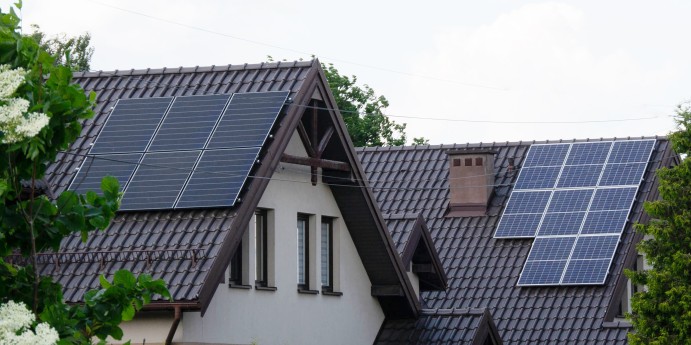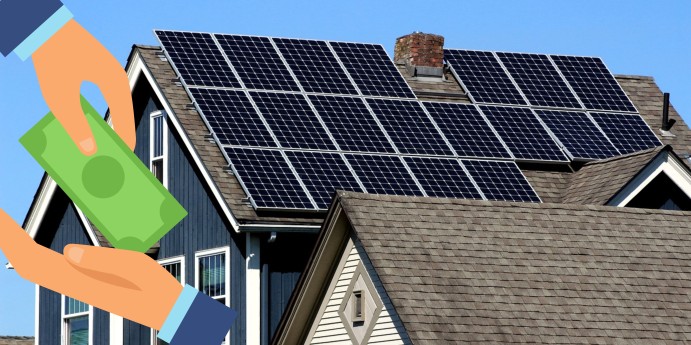Introduction
With solar panels on your roof, you’re generating more clean, renewable energy than you can use during the day. So, what can you do with this excess solar power? In this guide, we’ll explore practical ways to make the most of your surplus energy right at home.
How To Utilise Excess Solar Power?
Direct Usage:
The simplest way to utilize excess solar power is to consume it directly in your home. Schedule high-energy activities like running the dishwasher, doing laundry, or charging your electric vehicle during peak sunlight hours.
Load Shifting:
By shifting these energy-intensive tasks to the daytime, you tap into your solar energy when it’s abundant, reducing reliance on the grid.
Battery Integration:
Installing a home battery storage system allows you to store excess solar energy for later use. During the day, your solar panels charge the batteries. Then, at night or when the sun isn’t shining, you can draw from these batteries instead of purchasing electricity from the grid.
Nighttime Security:
Battery storage ensures you have power even during nighttime or cloudy days, providing energy security for your home.
Sell Back to the Grid:
If your area offers net metering, you can sell your excess solar power back to the grid. This means during sunny days, your meter runs backward as you export energy, and during nights or cloudy days, you draw energy from the grid.
Financial Benefits:
Net metering can lead to savings on your electricity bills, as you’re compensated for the excess energy you generate.
For The Homeowners Of New York
Overview:
NYC offers a robust net metering program, allowing solar panel owners to receive credit for the excess electricity they produce.
How It Works:
With net metering, when your solar panels produce more electricity than your home consumes, the excess energy is sent back to the grid. Your utility company then credits your account for this surplus energy at the retail electricity rate.
Benefits:
This means that during times of high solar production, such as sunny days, you can offset your electricity usage at night or during cloudy periods by using the credits from your excess solar production.
Requirements:
To participate in NYC’s net metering program, your solar system must be interconnected with the utility grid, and your utility company must provide net metering services.
For The Homeowners Of New New Jersey
Overview:
New Jersey also has a well-established net metering program, making it advantageous for solar system owners.
Program Details:
Similar to NYC, in NJ’s net metering program, excess solar electricity is sent back to the grid, and you receive credits for this surplus energy. These credits can then be used to offset your future electricity bills.
Solar Buyback Rates:
The buyback rates for excess solar electricity vary based on the utility company. However, they typically offer fair compensation for the energy you contribute to the grid.
Benefits:
By participating in NJ’s net metering program, homeowners can see significant savings on their electricity bills while promoting the use of clean energy.
How To Optimize the Usage of Solar Energy?
Smart Devices:
Invest in smart home devices that can automatically adjust energy usage based on solar production. Smart thermostats, for example, can optimize heating and cooling to coincide with peak solar hours.
Electric Vehicle Charging:
If you have an electric vehicle, schedule its charging during the day to align with solar production, minimizing reliance on grid electricity.
LED Lighting:
Switching to energy-efficient LED bulbs reduces overall electricity usage, making your excess solar power go further.
Energy Star Appliances:
Upgrading to Energy Star-rated appliances further reduces energy consumption, allowing you to maximize the use of your solar energy.
Emergency Preparedness: Use excess solar power to create a backup power system for emergencies. This can be especially valuable during grid outages, providing a reliable source of electricity.
Monitoring Tools:
Invest in monitoring tools that track your solar production and home energy usage. This helps you understand patterns and optimize your energy consumption.
Adjust as Needed:
Regularly review your energy consumption habits and adjust settings to maximize the use of your excess solar power.
Ready To Go Solar?
Ready to harness the full potential of solar power? Schedule a FREE Consultation with our solar experts today! Contact us at +18334786669 or visit our website SunLife Solar to book your appointment. With 25 years of warranty, we provide quality products and services for a reliable, long-term solar energy solution.
Conclusion
Utilizing excess solar power at home is not only environmentally friendly but also financially beneficial. Whether you choose to consume it directly, store it for later, or sell it back to the grid, there are numerous options to make the most of your solar investment. By integrating smart technologies, energy-efficient upgrades, and monitoring tools, you can create a home that runs efficiently on clean, renewable energy.
FAQs
Q: How do I know if my home is suitable for solar panel installation?
Ans: Homes with a south-facing roof with minimal shading are ideal for solar panels. Consult with a solar installer for a site assessment.
Q:What is the lifespan of a home battery storage system?
Ans: Most home battery systems have a lifespan of around 10-15 years, depending on usage and maintenance.
Q: Can I still use electricity during a grid outage with a battery storage system?
Ans: Yes, if you have a battery storage system, you can continue to power essential appliances during a grid outage.
Q: Will installing solar panels increase the value of my home?
Ans Yes, studies have shown that homes with solar panels typically have higher property values and sell faster than homes without solar.
Q: Are there government incentives available for solar panel installation?
Ans: Many regions offer incentives such as tax credits or rebates for installing solar panels. Check with your local government or utility provider for available programs.
 833-478-6669
833-478-6669



